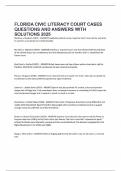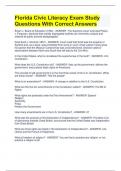Dred scott v sanford 1857 - Study guides, Class notes & Summaries
Looking for the best study guides, study notes and summaries about Dred scott v sanford 1857? On this page you'll find 49 study documents about Dred scott v sanford 1857.
Page 3 out of 49 results
Sort by

-
Florida Civic Literacy (Study guide for court cases)
- Exam (elaborations) • 3 pages • 2024
- Available in package deal
-
- $10.49
- + learn more
Florida Civic Literacy (Study guide for court cases) Marbury v. Madison (1803) - CORRECT ANSWER-Established judicial review. Supreme Court now had the authority to overturn a law based on Constitutionality. Mculloch v. Maryland (1819) - CORRECT ANSWER-(1819) U.S. Supreme Court case that declared the Second Bank of the United States was constitutional and that Maryland could not interfere with it. Established the Elastic Cause. Dred Scott v. Sanford (1857) - CORRECT ANSWER-Ruled slaves...

-
WGU C963 - Court Cases - American Politics and the US Constitution Super Study Guide Questions with 100% Correct Answers | Verified | Latest Update | 100% Pass
- Exam (elaborations) • 6 pages • 2024
- Available in package deal
-
- $8.99
- + learn more
WGU C963 - Court Cases - American Politics and the US Constitution Super Study Guide Questions with 100% Correct Answers | Verified | Latest Update | 100% Pass Marbury v. Madison (1803) Established judicial review. The courts have the power to strike down laws that they find to violate the Constitution. Dred Scott v. Sanford (1857) The Constitution was not meant to include American citizenship for black people. Plessy v. Ferguson (1896) Separate but equal - Racial segregation laws for publ...

-
Florida Civics Literacy Exam 2024 questions and answers 100%
- Exam (elaborations) • 14 pages • 2024
- Available in package deal
-
- $13.49
- + learn more
Florida Civics Literacy Exam 2024 questions and answers 100% Article I of the Constitution - ANSWERS Section of the Constitution laying out powers and responsibilities of the Legislative Branch Article II of the Constitution - ANSWERS Section of the Constitution laying out powers and responsibilities of the Executive Branch Article III of the Constitution - ANSWERS Section of the Constitution laying out powers and responsibilities of the Judicial Branch Article V of the Constituti...

-
FLORIDA CIVIC LITERACY COURT CASES QUESTIONS AND ANSWERS WITH SOLUTIONS 2025
- Exam (elaborations) • 3 pages • 2024
- Available in package deal
-
- $12.99
- + learn more
Marbury v. Madison (1803) - ANSWER Established judicial review. Supreme Court now had the authority to overturn a law based on Constitutionality. Mculloch v. Maryland (1819) - ANSWER (1819) U.S. Supreme Court case that declared the Second Bank of the United States was constitutional and that Maryland could not interfere with it. Established the Elastic Cause. Dred Scott v. Sanford (1857) - ANSWER Ruled slaves were not free citizens and no slave had a right to freedom. Dred Scott could not ...

-
Florida Civic Literacy (Study guide for court cases)
- Exam (elaborations) • 3 pages • 2024
- Available in package deal
-
- $7.99
- + learn more
Marbury v. Madison (1803) - CORRECT ANSWER-Established judicial review. Supreme Court now had the authority to overturn a law based on Constitutionality. Mculloch v. Maryland (1819) - CORRECT ANSWER-(1819) U.S. Supreme Court case that declared the Second Bank of the United States was constitutional and that Maryland could not interfere with it. Established the Elastic Cause. Dred Scott v. Sanford (1857) - CORRECT ANSWER-Ruled slaves were not free citizens and no slave had a right to fr...

-
Florida Civic Literacy Exam Study Questions With Correct Answers
- Exam (elaborations) • 10 pages • 2024
-
- $9.49
- + learn more
Florida Civic Literacy Exam Study Questions With Correct Answers Brown v. Board of Education (1954) - ANSWER- The Supreme Court overruled Plessy v. Ferguson, declared that racially segregated facilities are inherently unequal and ordered all public schools desegregated. Dred Scott v. Sanford (1857) - ANSWER- Court ruled that Scott was the property of Sanford and, as a slave, was prohibited from suing in court. Chief Justice Taney gives his opinion that the Missouri Compromise was unconst...

-
WGU C963 - Court Cases - American Politics and the US Constitution with complete verified solutions
- Exam (elaborations) • 4 pages • 2024
-
- $14.99
- + learn more
Marbury v. Madison (1803) Established judicial review. The courts have the power to strike down laws that they find to violate the Constitution. Dred Scott v. Sanford (1857) The Constitution was not meant to include American citizenship for black people. Brainpower Read More Plessy v. Ferguson (1896) Separate but equal - Racial segregation laws for public facilities are Constitutional as long as the segregated facilities were equal in quality. United States v. Miller (1...

-
Florida Civic Literacy (Study guide for court cases)
- Exam (elaborations) • 3 pages • 2024
- Available in package deal
-
- $9.99
- + learn more
Florida Civic Literacy (Study guide for court cases) Marbury v. Madison (1803) - CORRECT ANSWER-Established judicial review. Supreme Court now had the authority to overturn a law based on Constitutionality. Mculloch v. Maryland (1819) - CORRECT ANSWER-(1819) U.S. Supreme Court case that declared the Second Bank of the United States was constitutional and that Maryland could not interfere with it. Established the Elastic Cause. Dred Scott v. Sanford (1857) - CORRECT ANSWER-Ruled slaves...

-
Florida Civic Literacy Court Cases Complete Answers
- Exam (elaborations) • 3 pages • 2024
- Available in package deal
-
- $9.99
- + learn more
Florida Civic Literacy Court Cases Complete Answers Marbury v. Madison (1803) ️Established judicial review. Supreme Court now had the authority to overturn a law based on Constitutionality. Mculloch v. Maryland (1819) ️(1819) U.S. Supreme Court case that declared the Second Bank of the United States was constitutional and that Maryland could not interfere with it. Established the Elastic Cause. Dred Scott v. Sanford (1857) ️Ruled slaves were not free citizens and no slave had a...

-
Honor's Government Chapter 3 Exam Questions with Correct Answers
- Exam (elaborations) • 2 pages • 2023
- Available in package deal
-
- $13.49
- + learn more
Honor's Government Chapter 3 Exam Questions with Correct Answers Supremacy Clause - Answer-Federal Government (and Constitution) is supreme to (that is, supersedes) all other laws passed by the states or by any other subdivision of government. McCulloch vs Maryland (1819) - Answer-SCOTUS denied the right of a state to tax a federal bank using the Constitution's supremacy clause paved the way for later rulings upholding expansive federal powers. Gibbons v. Ogden (1824) - Answer-SCOTUS u...

That summary you just bought made someone very happy. Also get paid weekly? Sell your study resources on Stuvia! Discover all about earning on Stuvia


